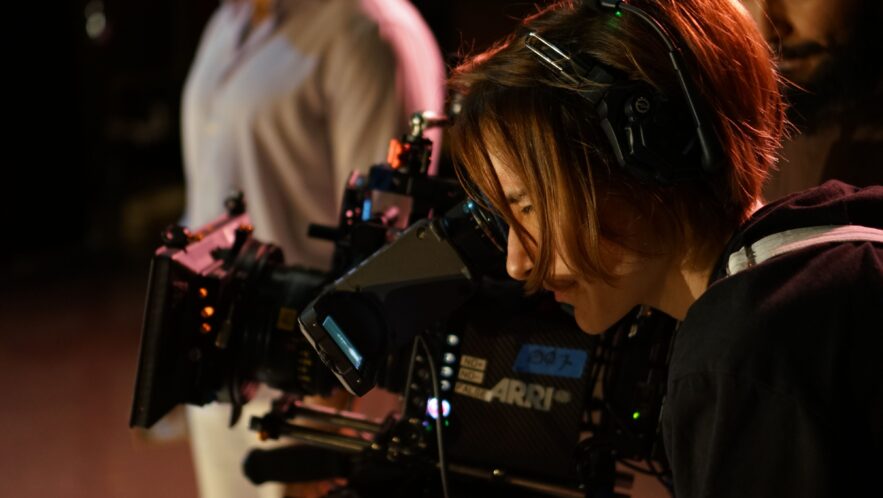By Rachel Herrow, August 4, 2025
In film and television, success takes more than technical skill. It requires emotional insight, clear vision, and the ability to adapt quickly, especially in high-pressure, creative environments. The most respected professionals in the industry are those who can navigate both the artistic and logistical complexities of storytelling.
Among them is Julie Peley, a director and cinematographer whose work spans genres and continents: “I’m always looking for what will be truthful to the actors’ psyche,” she says, underscoring her commitment to emotional authenticity.
From narrative dramas like After Mountains to socially conscious documentaries such as Traffikid, Peley has earned a reputation for merging precision with purpose, making her one of the most sought-after creatives working today.
Yet, beyond her work on set, Peley’s impact as an educator at the University of Miami is transforming the next generation of filmmakers. As a professor teaching Introduction to Production, Cinematography, and Introduction to Editing, she bridges the gap between academic theory and professional practice, earning accolades for her mentorship and innovative approach.
Peley’s journey into education is as dynamic as her filmmaking career. Born just south of Paris, she grew up immersed in the arts, from dance to photography, before finding her calling in film. Her multilingual fluency in French and English, paired with proficiency in Spanish and German, informs her global perspective, which she brings into both her creative and teaching endeavors.
“I grew up with European cinema, which has a different aesthetic than American films,” Peley explains.
Teaching is not just a side role for Peley—it’s an extension of her creative practice and a vital part of her professional identity. At the University of Miami, where she has taught courses in production, cinematography, and editing, Peley brings real-world experience into the classroom with passion and precision.
She believes her work guides future storytellers in finding their voice, embracing collaboration, and understanding the emotional and ethical weight of their work.
“I love teaching so much,” Peley says, reflecting on her role at the University of Miami.
“It’s incredibly stimulating for me. I get to watch students discover how to collaborate, fall in love with filmmaking, and sometimes get frustrated with it as well. But that’s all part of the learning process.”
“Directors often tell me they love how I bring that fresh, poetic approach to my framing and lighting. It’s something I don’t always notice myself, but it’s what they value.”
As a professor, Peley is an expert in fostering critical thinking and practical skills. Her Introduction to Production course, which she has taught four times, welcomes students from diverse majors, many of whom have never touched a camera. Over a semester, she guides them through storytelling, camera operation, editing, and sound design, culminating in two group films. “I teach them everything from scratch,” she explains.
“They learn how to tell a story visually, how to collaborate, and how to navigate the challenges of production. It’s about building their confidence as filmmakers,” Peley explains.
“Some of them have never picked up a camera before, and by the end of the semester, they’ve made short films they’re proud of. Watching that transformation—from hesitation to creative ownership—is incredibly rewarding.”
Peley’s ability to connect with students is rooted in her extensive industry experience. Her resume boasts an impressive array of projects, including editing Constellations and Azulejos with director Maria Paula Arboleda, as well as serving as director of photography on Cherry and Purple Grooves in 2024. Her technical proficiency with equipment like the Arri Alexa Mini and RED Komodo X, as well as software such as Adobe Premiere Pro and DaVinci Resolve, allows her to provide hands-on guidance.
“I always tell my students, if you want to be a filmmaker, you need to work on sets,” she says. To that end, she invites students to participate in her professional projects, providing them with real-world experience.
“I’ve had students watch me work, be part of the crew, and evolve. It’s amazing to see them grow.”
Daniela Orlando is a Miami-based producer who has collaborated with Peley on several film sets, including her thesis film. Daniela has witnessed Peley’s work firsthand as both a director of photography and director.
“Peley’s vision and sensitivity help shape a story when it’s falling apart,” she explains.
“Whether we’re missing footage or the narrative feels flat, she always finds a way to give it meaning and depth. She’s a natural problem solver—on set and in the edit.”
Her mentorship extends beyond technical skills. Peley emphasizes collaboration and resilience, lessons drawn from her own career. One standout example is her directorial debut, After Mountains, a thesis film inspired by a personal story. When a critical hospital location fell through a week before shooting, Peley transformed a university classroom into a convincing set, showcasing her problem-solving prowess.
“That was stressful, but it taught me to adapt,” she recalls.
“I share those stories with my students to show them that setbacks are part of the process, but creativity can overcome them.”
Peley’s impact as a highly regarded cinematographer and director is reflected in the achievements of her students. At a recent University of Miami film festival, one of the student films she mentored won the Best Film award. This accomplishment speaks volumes about her influence both in and out of the classroom.
“When I critique their work, I’m not just grading—it’s about helping them become better filmmakers,” she says.
“It’s a dialogue. I try to push them to think more critically about their choices, to understand why something works or doesn’t. But at the same time, they also teach me a lot about filmmaking, which makes me a better artist.”
Her teaching philosophy is a natural extension of the values that guide her filmmaking: authenticity, respect, and discipline. Whether on set or in the classroom, Peley emphasizes the importance of collaboration, clear communication, and emotional integrity. She fosters environments where everyone feels heard, supported, and empowered to be creative.
“I want my students to remember that we’re making art, not saving lives,” Peley notes, echoing her belief in maintaining a positive set environment.
“There’s no room for ego or unnecessary stress. We’re here to tell stories, to connect with others, and that should come from a place of kindness. We need to be kind and respectful to create something meaningful, because when the environment is healthy, the work naturally gets better.”
This ethos resonates strongly within her classroom, where Peley creates a space rooted in trust, peer engagement, and creative risk-taking. She places a strong emphasis on peer critique and collaboration, encouraging students to view feedback not as judgment, but as an essential part of the creative process.
Tom Musca is a veteran Hollywood screenwriter, producer, director, and professor at the University of Miami. He has taught Peley in both undergraduate and graduate screenwriting courses and mentored her on several film projects.
“Peley’s filmmaking skill set was apparent from the very beginning,” Musca recalls.
“She quickly became the top cinematographer at the school and one of the most talented directors. She gave her work a certain signature that was instantly recognizable, especially through her warm, soft lighting and emotionally rich character studies.”
By simulating the dynamics of a real film set—where professionals must work quickly, adapt to change, and communicate clearly—Peley helps her students build the soft skills and resilience that are just as important as technical knowledge.
Peley’s influence is amplified by her ability to blend academic rigor with practical application. Her courses have guided and critiqued over a hundred students across three years, helping them develop a critical eye for their work and a deeper understanding of cinematic storytelling.
She regularly incorporates examples from her projects—films like After Mountains, which won multiple festival awards, as well as Purple Grooves, Constellations, Azulejos, Tacet, Absent, Traffikid, News Without a Newsroom, Chelo, Cherry, Parodi Collection, and Climate Resilience—using them as case studies to demonstrate how to execute a creative vision within real-world constraints.
“I always strive to serve the story first,” she says, a mantra she instills in her students.
“The simplest techniques can have the biggest impact.”
Wenting Deng Fisher is a cinematographer who collaborated with Peley on her thesis film after being introduced through a mutual connection in the academic filmmaking community.
“Peley works in all aspects of filmmaking—she knows how to direct, shoot, gaff, and do color correction,” Wenting explains.
“Because of that, it was incredibly easy for us to collaborate. We shared a similar artistic taste, and the entire process just flowed effortlessly.”
Meanwhile, producer, director, and co-founder of the Coconut Grove Film Festival, Felipe Urso Torres, also lauds her director and cinematographer skills.
He first met Julie Peley when one of her films screened at the festival, and has since hired her as a director, cinematographer, and camera assistant on multiple commercial projects.
“She’s someone I fully trust on set,” Felipe says. “Julie works incredibly hard, has great taste, and brings a calm, focused energy to every production. That’s why I keep hiring her—she consistently delivers.”
For Peley, filmmaking isn’t about showing off technical skill—it’s about telling honest, emotionally grounded stories. She brings that same mindset into the classroom, urging students to move beyond flashy visuals and focus instead on meaning, connection, and the emotional core of their work.
As a highly sought-after educator due to her expertise in film and TV, Peley is shaping a future where diverse voices are not only welcomed but also empowered to thrive in the film industry.
Her work on socially impactful projects—such as Climate Resilience, Traffikid, and Familias—coupled with her deep commitment to mentorship, reflects a career built not just on individual success but on collective growth and lasting contributions.
“I want to tell stories that matter and help students do the same,” she says.
“Because when they find their voice, and understand how to use it with purpose, that’s when real change happens.” By guiding aspiring filmmakers from the classroom to the set, Peley isn’t just passing on her knowledge—she’s actively shaping the next generation of storytellers.



